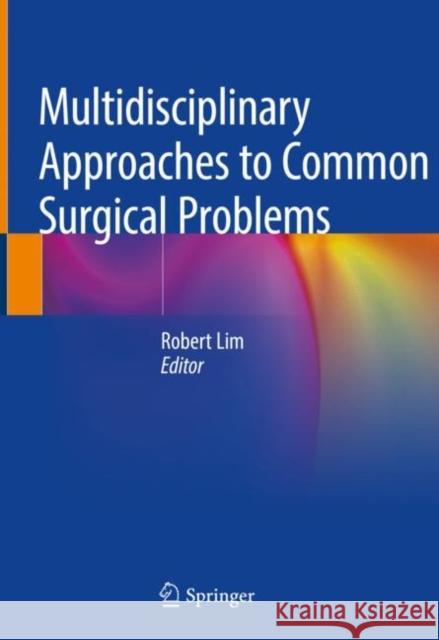Multidisciplinary Approaches to Common Surgical Problems » książka



Multidisciplinary Approaches to Common Surgical Problems
ISBN-13: 9783030128227 / Angielski / Twarda / 2019 / 493 str.
Multidisciplinary Approaches to Common Surgical Problems
ISBN-13: 9783030128227 / Angielski / Twarda / 2019 / 493 str.
(netto: 613,40 VAT: 5%)
Najniższa cena z 30 dni: 616,85
ok. 16-18 dni roboczych.
Darmowa dostawa!
"Although the book is intended for residents and practitioners, it could be used by students. It targets multiple specialties of surgery, gastroenterology, interventional radiology, radiology, obstetrics, endocrinology, internal medicine, and pulmonary critical care. ... The strength of this well-written book lies in its coverage of a broad array of acute surgical problems in a concise yet informative manner." (Vincent T Wu, Doody's Book Reviews, 27 September, 2019)
Section I: Bariatric Complications.- Surgery for Acute Bariatric Complications.- Radiology in the Acute Bariatric Patient.- Interventional Endoscopy-Endoluminal Therapy: Stenting, Clipping, and Suctioning.- Acute Non-surgical Bariatric Complications of Weight Loss Surgery.- Section II: Acute Presentations of Anal and Rectal Cancers.- Initial Presentation and Management.- Endoscopic and Transanal Approaches for Acute Anal and Rectal Cancers.- Abdominal and Perineal Operative Considerations for Acute Presentations of Anal and Rectal Malignancies.- Role of Radiology in Obstructing or Bleeding Anal and Rectal Cancer.- Role of Chemoradiation in Obstructing or Bleeding Anal and Rectal Cancers.- Section III: Acute Presentations of Colon Cancer.- Obstructing and Bleeding Colon Cancer: Surgical Management.- Endolumenal Therapies for Bleeding and Obstructing Colorectal Malignancy.- Section IV: Complications of Inflammatory Bowel Disease.- Complications of Inflammatory Bowel Disease: Initial medical Management and Role of Endoscopy.- Inflammatory Bowel Disease.- Section V: Incarcerated Paraesophageal Hernia.- Incarcerated Paraesophageal Hernia: Indicence, Presentatio, and Initial Management.- Surgical Management of Complicated Paraesophageal Hernias.- Section VI: Choledocolithiasis.- Gallstone Disease and the Timing of Cholecystectomy for Acute Cholecystitis and Gallstone Pancreatitis.- Choledocholithiasis and Cholangitis: Incidence, Initial Management, and Surgical Management.- Endoluminal Therapy for Choledocholithiasis and Cholangitis.- Percutaneous Transhepatic Cholangiography and the Role of Interventional Radiology in Biliary Obstructions.- Common Bile Duct Exploration.- Section VII: Diverticulitis.- Diverticulitis: Incidence and Initial Management.- Acute Diverticulitis: Imaging and Drainage.- Diverticulitis: Surgical Therapy.- Section VIII: Bleeding and Hernias in Cirrhotic Patients.- Coagulpathy in Cirrhotic Patients: Evaluation and Management.- Gastrointestinal Bleeding as a Result of Portal Hypertension.- Bleeding Cirrhotic Patients: Endoscopic Therapy.- Hernia Repair in Patients with Cirrhosis.- Section IX: Mesenteric Ischemia.- Mesenteric Ischmia: When to Operate, What to Respect, When to Reoperate.- Radiology of for Acute Mesenteric Ischemia.- Section X: Acute Pancreatitis.- Acute Pancreatitis.- Section XI: Hypertensive Crisis: Pheochromocytoma.- Perioperative and Hypertensive Crisis Management of Phechromocytomas.- Hypertensive Crisis due to Pheochromocytoma.- Section XII: Esophageal Obstruction and Perforation: Presentation and Management.- Esophageal Occlusive Disease: Endolumenal Thearpy.- Esophageal Occlusion: Rpole of Chemoradiation Therapy.- Section XIII: Abdominal Surgery in 3rd Trimester Pregnant Patients.- The Physiology of Pregnant Patients in Need of Accute Surgical Care.- Radiology in Pregnant Patient with Acute Abdominal Pain.- Multi-Disciplinary Approach to Acute Care Surgical Emergencies in Pregnancy.- Section IXX: Ruptured Liver Tumors.- Management of Ruptured Hepatic Tumors.- Section XX: GI Bleeding from Stomach and Duodenal Disease.- Surgery: When to Operate and When to Resuscitate and What Kind of Operation.- Endoscopic Management of Non-Variceal Acute Gastrointestinal Bleeding.- Interventional Radiology in GI Hemorrhage.- Section XXI: Empyema.- Empyema: Incidence and Medical Management.- Surgical Management of Acute Empyema.- Section XXII: Bleeding from Idiopathic Thrombocytopenic Purpura.- Bleeding from Immune Thrombocytopenia-Medical Management: Steroids, Immunoglubulins, and New Therapies.- Immune Thrombocytopenia: Incidence, Diagnosis, Presentation, and Natural History.- Section XXIII: Esophageal Achalasia.- Esophageal Achalsia.- Esophageal Achalasia: Endoluminal Therapy.- Surgical Therapy of Esophageal Achalasia: Per Oral Endoscopic Myotomy.
Robert B. Lim, MD, FACS, FASMBS
Associate Professor of Surgery
Chief, Minimally Invasive Surgery
Tripler Army Medical Center
Department of Surgery
Honolulu, HI, USA
Emergent general surgical diseases are the most frequent causes of in-hospital deaths and are the most costly diseases to treat. The purpose of this book is to provide clinicians with an understanding of their roles and that of other disciplines for the treatment of acute and emergent surgical diseases. It is also designed to give a clear pathway for using multiple disciplines to manage these diseases. The text details over 20 problems routinely seen in clinical practice and approaches the disease from the perspective of experts within the different specialties. It provides a comprehensive, evidenced-based overview and the most up-to-date technology available in clinical practice. An emphasis on new, less invasive techniques that may have a broader range of indications in the future is also included. Ultimately the reader will have a better understanding of these acute problems, the other specialties they work with, and when to integrate these other specialties when they encounter these urgent clinical scenarios.
1997-2026 DolnySlask.com Agencja Internetowa
KrainaKsiazek.PL - Księgarnia Internetowa









